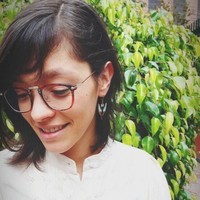ESR 7: From participation to co-production of socio-hydrological knowledge
Early Stage Researcher: Paula Zuluaga Guerra
Host institution: Fundación Nueva Cultura del Agua, Spain
Principal supervisor: Prof. Miguel Ángel Esteve
Co-supervisor: Prof. Jampel Dell'Angelo
Non-academic co-supervisor: Dr. Julia Martínez Fernández
Topic
An advanced water governance has to address several complex issues: a) how to integrate different disciplines (interdisciplinary approach) and sources of knowledge (co-production of knowledge) in a coherent way and with a problem-based approach; b) how to develop a participatory framework to define the problems to be solved, the goals to be achieved, the range of options to be explored, the criteria to be applied and the decisions to be taken and c) how to establish a science-policy interface facilitating the use of the best available knowledge by the concerned actors in a participatory, deliberative decision process. The severe eutrophication crisis of the Mar Menor lagoon (Spain), caused by the unsustainable management of its basin, is causing important environmental, social, economic, and political consequences and constitutes a paradigmatic example of the above-mentioned complex issues. This study will develop an innovative framework for the science-policy integration, will apply a variety of methods, particularly socio-ecological modelling and participatory approaches, and will test new methodologies and tools to facilitate the use of the best available knowledge by the relevant actors around the Mar Menor lagoon, in order to define, valuate and implement the best solutions to recover this unique water ecosystem.
This research project will:
- To develop and apply an innovative methodological framework for an advanced science-policy interface around the socio-environmental crisis of Mar Menor lagoon;
- To apply interdisciplinary methodologies (socio-ecological modelling, indicators, stakeholder analysis, participatory techniques) to understand how the ecological, hydrological, social, economic, and political dimensions interact around the Mar Menor
- To test advanced techniques to facilitate and use the best available knowledge in participatory, deliberative decision processes.
Expected results:
- A well-defined pathway for an advanced governance defining challenges, goals, and effective solutions for the Mar Menor, based on a participatory and knowledge-based approach;
- An innovative methodological approach for the successful integration of knowledge provided by different disciplines around a common problem and socio-ecological system.
- A new, effective framework for the co-production of knowledge and policy proposals, based on a close interaction between actors in academic and non-academic arenas, in order to effectively curtail the entrance of pollutants into the lagoon while building a socio-political consensus for sustainable land and water use patterns in the watershed.
About Paula Zuluaga Guerra
Paula decided to study ecology for she believed it would allow her to explore the relationship between people and nature through the exploration of the ecological intricacies of one of the most biodiverse countries in the world. Indeed, during her BSc at the Pontificia Universidad Javeriana Paula was able to learn about the Páramos, the Andean tropical dry forests, and the rainforests in the Northeast of the Colombian Amazon. But the lessons were much more complex than she originally thought. For the first time in her life, Paula realised that gender matters. To her, it implied managing difficult working relations and surpassing practical obstacles in the field, but for other women, it often meant existential nullity. Also, she realised that participation, as a space for horizontal dialogue, is more an aspiration than a concrete possibility when working in contexts of conflict and profound societal inequalities.
After seven years of professional practice in Colombia, and a MSc in Global Environmental Politics and Society at the Edinburgh University, the main motivation behind Paula's work is to revise those early learnings, so she can use her relatively advantaged position to conduct a form of research that could plant the seed for transformative change. Becoming part of NEWAVE is a means to do this. Paula is excited by the opportunity to lead a research with Fundación Nueva Cultura del Agua on the co-production of knowledge in the “Mar Menor Lagoon” in Murcia, Spain. Within this project they will be rethinking participation at least in two ways: together with social actors they will co-design computational models and co-create innovative ways to bridge science and policy-making; and expand the knowledge around the governance of aquatic socio-ecosystems by disentangling the relationship between water and land politics that shape them.
LinkedIn profile: Paula Zuluaga Guerra
Contact
Paula Zuluaga Guerra
NEWAVE Early Stage Researcher, Ph.D. Candidate
Institute of Environmental Studies, Vrije Universiteit Amsterdam, The Netherlands
Website: www.ivm.vu.nl
Dr. Miguel Angel Esteve
Professor of Ecology at University of Murcia
Fundación Nueva Cultura Del Agua, Spain
Website: www.fnca.eu
Prof. Jampel Dell'Angelo
Assistant professor of Water Governance & NEWAVE Principal Investigator
Institute of Environmental Studies, Vrije Universiteit Amsterdam, The Netherlands
Website: www.ivm.vu.nl
Dr. Julia Martinéz-Fernández
Executive Director
Fundacion Nueva Cultura del Agua (FNCA), Spain
Website: www.fnca.eu/en




